广州版小学六年级Module 3
最新 新版广州版小学英语六年级上册M3集体备课(第二次)
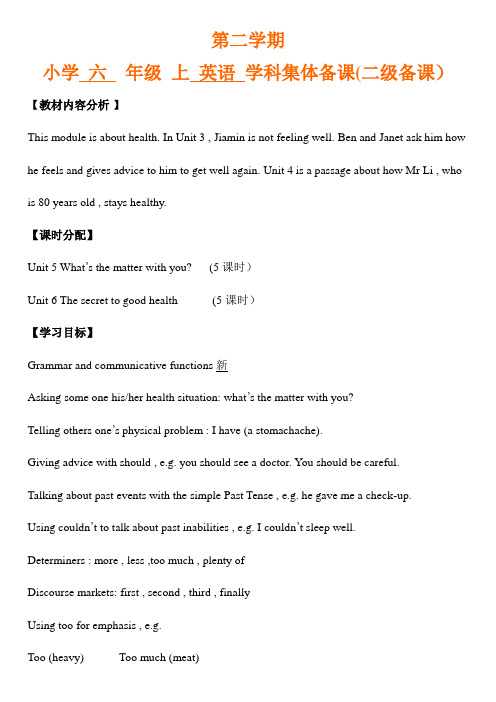
第二学期小学六年级上英语学科集体备课(二级备课)【教材内容分析】This module is about health. In Unit 3 , Jiamin is not feeling well. Ben and Janet ask him how he feels and gives advice to him to get well again. Unit 4 is a passage about how Mr Li , who is 80 years old , stays healthy.【课时分配】Unit 5 What’s the matter with you? (5课时)Unit 6 The secret to good health (5课时)【学习目标】Grammar and communicative functions新Asking some one his/her health situation: what’s the matter with you?Telling others one’s physical problem : I have (a stomachache).Giving advice with should , e.g. you should see a doctor. You should be careful.Talking about past events with the simple Past Tense , e.g. he gave me a check-up.Using couldn’t to talk about past inabilities , e.g. I couldn’t sleep well.Determiners : more , less ,too much , plenty ofDiscourse markets: first , second , third , finallyUsing too for emphasis , e.g.Too (heavy) Too much (meat)Imperative sentences (affirmative and negative), e.g. Get up early.【教学重难点】Pupils will be able to :Ask people their physical state ;Describe people’s physical problems;Give suggestions on what to do about a physical problem ;Explain what someone did to deal with a physical problem; wUse discourse markers to describe something more coherently;Understand texts describing a healthy lifestyle;Use the correct preposition before time phrases and phrases denoting location;Read the rhyme in this module.6年级科任老师:组长审核:教务处审核:组长签名:教务处签名:日期:日期:编号: 1 (第周、月日、星期、第节)编号: 2 (第周、月日、星期、第节)编号: 3 (第周、月日、星期、第节)课Unit 5 What’s the 单元编号: 4 (第周、月日、星期、第节)编号: 5 (第周、月日、星期、第节)编号: 6 (第周、月日、星期、第节)编号:7 (第周、月日、星期、第节)编号:8 (第周、月日、星期、第节)编号:9 (第周、月日、星期、第节)编号:10 (第周、月日、星期、第节)。
六年级英语下册 Module 3 Unit 7(3)教案 广州版

Module3 Unit7 Dr Sun Yatsen一、教材内容分析:Module 3 主要是学习历史人物的事迹,从中教育学生要爱国,爱校,热爱生命。
本单元内容丰富,知识点系统。
但是单词多,并且长。
要学生一节课掌握,需要老师很好地把握教材,抓住重难点。
教材中涉及到历史文化,人物事迹,老师要学生通过各种途径查找资料,扩大知识面。
二、教学对象分析:六年级的学生个性较强,喜欢自我表现。
在教学设计上,要采用灵活有趣的教学方法,激发他们的兴趣,同时满足他们的要求。
Teaching Aims:1. Can talk about some famous people.2.To extend the pupils` knowledge of past simple verb forms , to talk about past events in the life of a historical figure.Language focus: To introduce useful vocabulary for narrating historical events. Teaching important points:Can talk about some famous people, for example Dr Sun Yatsen,Zhou Enlai, Deng Xiaoping, and Mao Zedong.Teaching Difficult points: Use the past tense. and some sentence patterns. Including: He was born in Guangdong. Dr Sun Yates was the father of modern China. He was against the emperor. Finally he started to change China.Teaching Aids:Multi-media, words cards and some other objects. Some information about the famous persons from the Internet.Teaching steps:I.热身、复习和导入Warming –up1. Sing the song “I want to be a teacher”.2. Review the words about “job”T: a: What do you want to be when you grow up?S: answer: I want to be a fireman/ doctor/ nurse/ teacher/ solider/… (flash wordsCards.)II.新授内容1.学习单词 ( 运用单词卡片和free talk) 指导学生用新单词造句Be born: Where were you born? I was born in __________.Modern: 理解Modern ChinaGo on 用go on doing something 造句Leader 理解group leaderAgainst 理解句子He was against the emperor.EmperorFree 告诉学生free 可以做动词,也可以做形容词。
教科版(广州)英语六年级上册Module3 Unit 5 课件

动词原形
ask stay learn smell 闻 play clean help start 开始
动词过去式
asked stayed learned smelled played cleaned helped started
1. What’s the matter with you? 你怎么啦? = What’s wrong with you?
1. health 健康(名词) ;healthy健康的(形容词) in good health 健康状况好 in poor health 健康状况不好 2. I brush my teeth twice a day. once一次 twice两次 three times 三次 four times 四次
MEDICINE (medicine)、 WATER (water)、
✓
✓ ✓
It was raining. He wore
walked to school
wet clothes.
had a cold
see a doctor
Grammar Time
P 30-31
表示地点和时间的介词
重点语法
Show time
准确 correct
声音大 loud
流利 fluent
Self-
合作 cooperative
创新 creative
assessment
have a stomachache
have a cold
have a broken leg
have a fever
have a broken finger have a headache
I feel…… I have……
教科版(广州)英语六年级上册Module3Unit6Thesecrettogoodhealth课件

What’s the most important thing for healthy life?
should/ shouldn’t… Don’t… Eat/Drink/ Do…
Keep a good diet.
Eat a lots of fruits.
Eat an apple everyday.
things to stay healthy. First,___sl_e_e_p_e_a_r_l_y___________. Second,__t_a_k_e__m_o_r_e_e_x_e_r_c_is_e______. Third,__d_r_i_n_k_p_l_e_n_t_y_o_f_w__a_te_r______. Finally,d_o_n_’_t_w_o_r_r_y_t_o_o__m_u_c_h_____.
Drink a lot of water, not coke or coffee.
Mind/ Mood
Smile a lot. To be happy.
Talk to others. Don’t be sad/ angry. Never worry too much.
Drinking
Drink some milk ,tea or fresh juice, not juice drinks.
Work in groups, design a health poster(健康海报).
There are different kinds of people around us, some are too fat, some worry too much, some get up too late. Can you help them too?
广州版小学英语六年级下册Module3Unit7之三

Who’s Lu Xun? He was a (great Chinese) writer. When was he born and when did he die? He was born in 1881 and died in 1936.
1949----- nineteen forty-nine 1980----- nineteen eighty 2000----- two thousand 2006----- two thousand and six
1911 1976
2046
1802
1893 1979
2008 2010
Who found Australia? James Cook.
He was born in 1904 and died in 1945.
Who’s Marie Curie ? She was a Polish scientist. When was she born and when did she die?
She was born in 1867 and died in 1934.
Guangdong. He was born in Xiangshan County (香山县).But now it is a part of Zhongshan City (中山市).It’s not far away from Guangzhou.
the father of modern China
When was he born and when did he die? He was born in 1889 and died in 1977.
广州版英语教材六年级下册Module3 Famous People教材分析
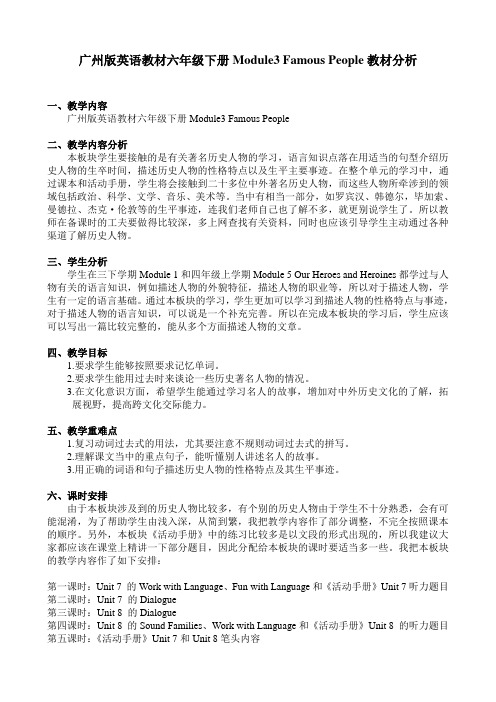
广州版英语教材六年级下册Module3 Famous People教材分析一、教学内容广州版英语教材六年级下册Module3 Famous People二、教学内容分析本板块学生要接触的是有关著名历史人物的学习,语言知识点落在用适当的句型介绍历史人物的生卒时间,描述历史人物的性格特点以及生平主要事迹。
在整个单元的学习中,通过课本和活动手册,学生将会接触到二十多位中外著名历史人物,而这些人物所牵涉到的领域包括政治、科学、文学、音乐、美术等。
当中有相当一部分,如罗宾汉、韩德尔,毕加索、曼德拉、杰克·伦敦等的生平事迹,连我们老师自己也了解不多,就更别说学生了。
所以教师在备课时的工夫要做得比较深,多上网查找有关资料,同时也应该引导学生主动通过各种渠道了解历史人物。
三、学生分析学生在三下学期Module 1和四年级上学期Module 5 Our Heroes and Heroines都学过与人物有关的语言知识,例如描述人物的外貌特征,描述人物的职业等,所以对于描述人物,学生有一定的语言基础。
通过本板块的学习,学生更加可以学习到描述人物的性格特点与事迹,对于描述人物的语言知识,可以说是一个补充完善。
所以在完成本板块的学习后,学生应该可以写出一篇比较完整的,能从多个方面描述人物的文章。
四、教学目标1.要求学生能够按照要求记忆单词。
2.要求学生能用过去时来谈论一些历史著名人物的情况。
3.在文化意识方面,希望学生能通过学习名人的故事,增加对中外历史文化的了解,拓展视野,提高跨文化交际能力。
五、教学重难点1.复习动词过去式的用法,尤其要注意不规则动词过去式的拼写。
2.理解课文当中的重点句子,能听懂别人讲述名人的故事。
3.用正确的词语和句子描述历史人物的性格特点及其生平事迹。
六、课时安排由于本板块涉及到的历史人物比较多,有个别的历史人物由于学生不十分熟悉,会有可能混淆,为了帮助学生由浅入深,从简到繁,我把教学内容作了部分调整,不完全按照课本的顺序。
广州版六年级英语下册教案Module_3
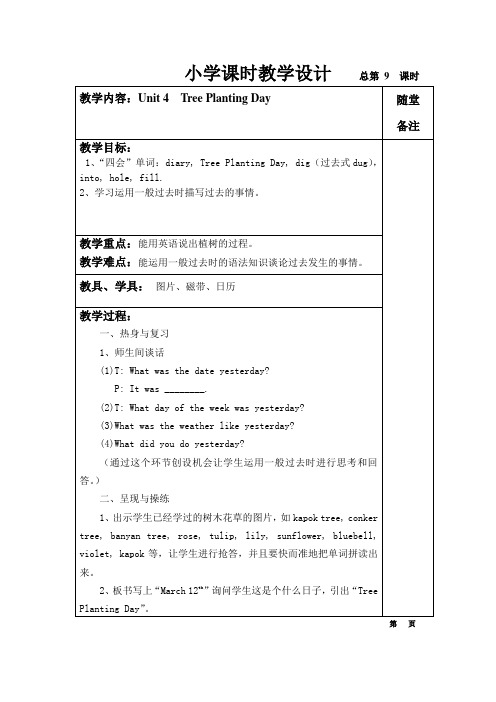
小学课时教学设计总第9 课时教学内容:Unit 4 Tree Planting Day随堂备注教学目标:1、“四会”单词:diary, Tree Planting Day, dig(过去式dug),into, hole, fill.2、学习运用一般过去时描写过去的事情。
教学重点:能用英语说出植树的过程。
教学难点:能运用一般过去时的语法知识谈论过去发生的事情。
教具、学具:图片、磁带、日历教学过程:一、热身与复习1、师生间谈话(1)T: What was the date yesterday?P: It was ________.(2)T: What day of the week was yesterday?(3)What was the weather like yesterday?(4)What did you do yesterday?(通过这个环节创设机会让学生运用一般过去时进行思考和回答。
)二、呈现与操练1、出示学生已经学过的树木花草的图片,如kapok tree, conkertree, banyan tree, rose, tulip, lily, sunflower, bluebell, violet, kapok等,让学生进行抢答,并且要快而准地把单词拼读出来。
2、板书写上“March 12th”询问学生这是个什么日子,引出“Tree Planting Day”。
第页3、Ask and answerT: Look at the date, children, what day is it?S: It’s 植树节(Tree Planting Day)T: What do we do on March 12th?S: We plant trees.三、PracticeT: How do we plant trees?(请一些曾经参加过植树的同学介绍经过)。
And then teacher take the pictures and ask and say?a. … dig (dug) holes.b. … put (put) the Young trees into the holes.c. … fill (filled) the holes with earth.d. … water (watered) the trees.Practise the sentences .(Teacher and students or students and students )四、Homework1、抄写新单词2、写日记一-篇3、读课文并理解板书设计:Unit 4 Tree Planting DayMarch 12tha. … dig (dug) holes.b. … put (put) the Young trees into the holes.c. … fill (filled) the holes with earth.d. … water (watered) the trees.教学后记:第页小学课时教学设计总第10课时教学内容:Unit 4 Tree Planting Day 随堂备注教学目标::1、“四会”单词carry, hope2、学习用英语描述植树的程序教学重点:能理解课文,说出植树的过程教学难点:运用一般过去时的语法知识谈论过去发生的事情教具、学具:pictures, tapes教学过程:一、GreetingT : How do we plant trees?S1: We dig holes.S2: We put the young trees into the holes.S3: I filled the holes with earth.S4: I watered the trees.二、呈现并学习课文1、Listen to the tape and read after it two time.2、Read the text and in group, and the tell the main ideaof the text.三、巩固与操练1、听录音跟读课文。
广州版六年级下册《Module 3 Famous People》公开课教案 (2)

Module 3 Famous People教学内容:Unit Seven-----Unit Nine教学目标:1.能按要求掌握本单元的音标\单词和句子.2.通过学习本单元的课文, 能就“famous people〞的话题进行简单的交流3.能用正确的升降调朗读肯定句和一般疑问句。
4.会做本单元课本和活动手册的习题.教学重点:掌握本单元的单词和重点句型.教学难点:能用简单的句子谈论一些名人的情况。
教具使用:图片\单词卡\音标卡\录音机和投影教学课时:5课时教学过程:第一课时Unit Seven Dr Sun Yatsen一、复习(Revision)1.看图片复习短语和练习说话。
2.听写(Dictation these words):driver teacher doctor nurse policeman dentist workerfarmer cooker student pupil waiter assistant二、新授1.听录音并结合音标学习以下新单词、短语〔要求背诵〕。
Learn the new words:historical历史性的Dr=Doctor医生、博士born出生modern现代的leader领袖against反对emperor皇帝free自由的finally最后memorial纪念hall厅president总统lose丧失premier总理speech发言be born 出生memorial hall 纪念堂make a speech 发言、讲话2.听录音,学习朗读课文。
:(1)A: What are you reading?B: I’m reading about a famous historical person.(2)He was born in Guangdong.(3)Dr Sun Yatsen was the father of modern China.(4)He was a great leader. He was against the emperor. Ha tried to changeChina and free the people.(5)I think he loved the people and the people loved him.(6)You can visit the Dr Sun Yatsen Memorial Hall in Guangzhou.4.小组朗读课文, 根据课文的投影,分段背诵课文。
新版广州英语六年级上期末复习Module 3(有听力音频)

新版广州英语六年级上期末复习之M3(Module 3)(听力二维码在第四题旁边,删除覆盖的绿色的图片就可以看到。
扫描即登录即可使用)一、听句子三次,选出句子中含有的信息,并把字母编号写在括号内。
( ) 1. A. hour B. hours C. our( ) 2. A. health B. healthy C. help( ) 3. A. eat B. ate C. at( ) 4. A. breakfast B. lunch C. dinner( ) 5. A. same B. said C. simple( ) 6. A. to B. two C. too( ) 7. A. most B. more C. many( ) 8. A. nice B. less C. little( ) 9. A. hand B. hands C. head( ) 10. A. milk B. tea C. water二、听句子三次,根据听到的顺序,用英文大写字母给下图编号。
三、听问句三次,选择合适的回答。
( ) 1. A. We should sleep at least 8 hours each night.B. We should sleep at least 18 hours each night.C. We should sleep at least 5 hours each night.( ) 2. A. She has a fever.B. He has a toothache.C. She has a cold.( ) 3. A. We should eat vegetables.B. We should not eat too much sweet or oily food, and we should not drink Coke or coffee.C. We should drink tea or water.( ) 4. A. The most important thing for a healthy life is to be happy.B. Take plenty of sleepC. Get plenty of sleep.( ) 5.A. Eat too much meat.B. Eat many candies.C. Wash your hands before you eat.四、听句子三次,写出句子中所缺的单词。
广州版小学英语六年级下册MODULE3 UNIT7之三 PPT课件
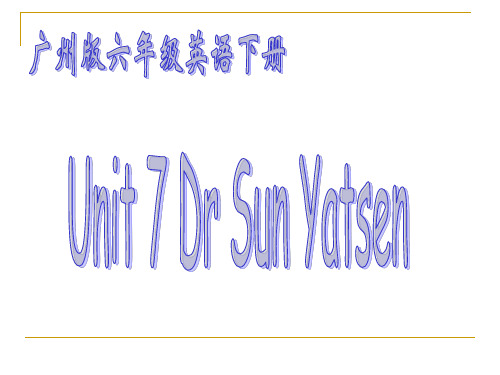
the father of
He was born in Shaoshan, Hunan. New China
新中国之父
He was a great leader of China.
Who was he? He was the premier of China.
In 1976,the Chinese people lost their Premier Zhou Enlai. All the China people were very sad.
1949----- nineteen forty-nine 1980----- nineteen eighty 2000----- two thousand 2006----- two thousand and six
1911 1976
2046
1802
1893 1979
2008 2010
Who found Australia? James Cook.
What is Sally doing? She is reading a story about Robin Hood. When did people begin to talk about Robin Hood?
In the 14th century. Was he clever and brave ?
When did he find Australia? In 1770
Who’s George Washington? He was the first president of America. That’s why people call him the father of America.
Who’s Armstrong? He was an American astronaut. He went to the moon in 1969. That was the first time a human being stepped on the moon.
广州版英语六年级Module 3 Famous People unit6 SteveJobs

I was born in china
时间方面 in加季节、月份、泛指的上午、下午和晚上 (in the morning,in the afternoon,in the evening) on加具体日期(某年某月某日、某月某日、某个节日、某一天) 或者特指某一天的上午、下午、晚上(on a cold morning、on the evening of May 8th) at加具体时刻(几点或者几点几分)
比尔·盖茨创造了Windows系统,挣了很多的钱。
In 1955, Steve Jobs was born in American.
When Steve Jobs finished school, he worked as a computer gamer-maker.
In 1976, he and his friend started
• Steve Jobs leans on the new "Macintosh" personal computer in a shareholder's meeting in California
As president and CEO of NeXT Computer . He shows off his company's new NeXT station after an introduction to the public in San Francisco
Unit 6 Steve Jobs
play with 玩耍;玩……
They are playing with an iPad.
come true 实现
I hope my dream will come true.
Module3Module6(讲义)教科版(广州)英语六年级上册
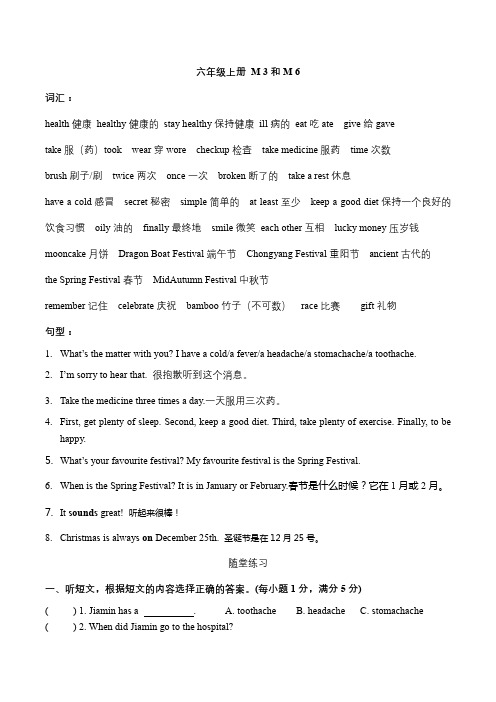
六年级上册M 3和M 6词汇:health健康healthy健康的stay healthy保持健康ill病的eat吃ate give给gavetake服(药)took wear穿wore checkup检查take medicine服药time次数brush刷子/刷twice两次once一次broken断了的take a rest休息have a cold感冒secret秘密simple简单的at least至少keep a good diet保持一个良好的饮食习惯oily油的finally最终地smile微笑each other互相lucky money压岁钱mooncake月饼Dragon Boat Festival端午节Chongyang Festival重阳节ancient古代的the Spring Festival春节MidAutumn Festival中秋节remember记住celebrate庆祝bamboo竹子(不可数)race比赛gift礼物句型:1.What’s the matter with you? I have a cold/a fever/a headache/a stomachache/a toothache.2.I’m sorry to hear that. 很抱歉听到这个消息。
3.Take the medicine three times a day.一天服用三次药。
4.First, get plenty of sleep. Second, keep a good diet. Third, take plenty of exercise. Finally, to behappy.5.What’s your favourite festival? My favourite festival is the Spring Festival.6.When is the Spring Festival? It is in January or February.春节是什么时候?它在1月或2月。
最新广州版英语小学六年级下册Module 3 Famous People优质课教案 (1)

Module 3 FAMOUS PEOPLEUnit7 Dr Sun Yatsen一、教学内容分析:Unit 7是Module 3 Famous People的第一篇课文。
文章内容主要以谈论历史上的领袖孙中山先生为主线。
本课没有出现较难的句型,旨在让学生学习和巩固一般过去时的特殊疑问句的句型结构并在真实的情景中进行的综合运用。
整篇课文以谈论历史人物为主线情景性较强,容易引起学生较浓的学习兴趣。
通过学习,希望学生能较好地理解课文并能用过去时谈论一些名人的情况。
二、教学对象分析:六年级的学生对知识的理解能力和学习能力相对于其它年级的学生要强,加上学生已经学过了描述人物特征、比较级和过去时,因此对学生来说不会很难。
在学习本课的时候,要根据学生对历史人物的兴趣去引导学生理解课文。
本课是想通过学习让学生能根据自己的实际情况谈论一些名人,不断提高他们对所学的知识的综合运用能力。
三、教学目标:1、语言知识目标Vocabulary: Dr=Doctor be born modern go on leader free finally(四会) Historical against emperor memorial hall memorial hall (三会)Structure: 理解和初步运用以下句型1. He/she was born in ….2.What did he do? Why was he so important ?He tried to change China and free the people.3 .Don’t you know?2、语言技能目标(1)能根据情境和图片较好地理解单词和句型。
(2)能较好地理解整篇课文的内容,并能较流利地朗读课文。
(3)能用过去时谈论一些名人的情况。
3、情感态度目标进一步提高学生对英语的学习热情,增强学习兴趣。
通过各种积极的评价调动学生积极主动地参与课堂活动,大胆开口,主动模仿。
(完整word版)广州新版小学六年级上Module-3知识点及练习(良心出品必属精品)

1教学过程一、课堂导入2Custom is a second nature.习惯为第二天性。
二、复习预习3教师引导学生以提问、回顾、抽测笔记的形式复习上节课所学的Unit6中相关短语句型及祈使句的用法, 针对上节课的作业进行讲评、订正、答疑, 并通过对形容词具体用法的分析和扩展导入本节课所要学习的新内容。
三、知识讲解知识点1: 词汇短语拓展41. health n.健康 healthy adj.健康的Healthy eating habits 健康的饮食习惯e.g.Healthy eating habits are very important.健康的饮食习惯很重要。
2.matter n.事情同义词: thing(s) 东西, 事情e.g.What is the matter? =What is wrong ? (你)怎么了?3.ill adj.病的,坏的,邪恶的 illness n.疾病近义词: weak 虚弱的, 无力地e.g.He was ill last week.他上周病了。
4.hear v.听到(强调听的结果)Listen to 听(强调听的过程)e.g.They stopped to listen to the teacher, but they heard nothing.他们停下来听老师讲课, 但是什么都没有听到。
5.give v.给过去式: gavegive sb sth=give sth to sbe.g.I gave my friend a lift on her birthday.我给我朋友一个礼物在她生日那天。
6.time n.次,时代,节拍5once 一次, twice 两次, three times 三次e.g. I go swimming once a week.我一周游一次泳。
7.take the medicine 吃药e.g.Take the medicine three times a day and take a good rest.一天三次药并好好休息。
广州教科版六年级上册英语Module3课件PPT (1)

Tips to keep healthy
Take plenty of exercise.
Tips to keep healthy
The most important thing for a healthy life is to be happy.
请替换文字内容
点击添加相关标题文字,点击添加相关标题文字,点击添加相关标题文字
请替换文字内容
点击添加相关标题文字,点击添加相关标题文字,点击添加相关标题文字,点击添加相关标题文字。
请替换文字内容
教学策略
01
02
03
04
05
教学策略
加入标题
加入标题
加入标题
加入标题
添加标题
点击输入您的文字内容点击输入您的文字内容点击输入您的文字内容点击输入您的文字内容点击输入您的
What did the doctor say?
Take this medicine three times a day for one week.
Let’s practice!
I have a toothache.
You should brush your teeth twice a day.
You should have a rest.
Let’s think
What have we learnt in this class?
Read the text and try to remember the sentences in this text.
Module 3 Health Unit 6 The secret to good health
教科版(广州)英语六年级上册Module 3 Unit 6 课件

How big 意为“多大”,提问体积。How big is your box? 你的箱子多大?
How tall 意为“多高”,提问高度。How tall is the tree? 这棵树多高?
How many 意为“多少”提问可数名 How many pens do you have?
词的数量。
你有多少支钢笔?
How much 意为“多少”,提问不可 How much water do you want?” 数名词的数量或价格。 你要多少水?How much is it? 多少 钱?
How well 意为“多好”,提问程度。How well do you play piano?
把握课文重点句型: 1. Mr Li is not a doctor or a nurse, but he knows
1. What’s the matter with you? 你怎么啦? = What’s wrong with you?
I feel ill. I have a stomachache.
2. I’m sorry to hear that.
3. You should see a doctor. 4. I think you’ll be well soon. 5. He asked me to take this medicine three times a day for one week.
at least
至少
First, get plenty of sleep, at least 8 hours each night, so you will feel good for the next time.
diet
n.节食;限食
- 1、下载文档前请自行甄别文档内容的完整性,平台不提供额外的编辑、内容补充、找答案等附加服务。
- 2、"仅部分预览"的文档,不可在线预览部分如存在完整性等问题,可反馈申请退款(可完整预览的文档不适用该条件!)。
- 3、如文档侵犯您的权益,请联系客服反馈,我们会尽快为您处理(人工客服工作时间:9:00-18:30)。
嘉欣工作室Module 3 Famous People一.本单元重点词汇及词组。
historical _____________ against _______________ emperor ______________ memorial _____________ hall _________________ memorial hall __________ president _____________ premier ______________ speech _______________ make a speech _________ modern ______________ go on ________________ be born ______________ leader ________________ finally _______________ free __________________ lose _________________ century _______________ cos=because __________ Asian ________________ Asian Games__________ inventor ______________ musician _____________ revolutionary __________ clever _______________ brave _________________ forest ________________ the poor _____________ rich ___________________ the rich ______________ nobody ______________ wood _________________ full of _______________ writer _______________ painter ________________ scientist ______________二. 本单元重点句型。
1. He was born in ... + ( 地点、年份) 他出生在……语法结构:( ... was/ were born in... )2. Dr Sun Yatsen was the father of modern China. 孙中山是现代中国之父。
语法结构:( the father of... ……之父)3. He was a great leader. 他是一个伟大的领袖。
语法结构:( a great leader 一个伟大的领袖)4. He was against the emperor. 他反对皇帝。
语法结构:be (am, are, is, was, were) against... 反对……5. He tried to change China and free the people. 他尝试改变中国和解放人民。
语法结构:try to do sth. 试图做某事(这里的do是指加上动词原形的意思)6. He took from the rich and gave to the poor. 他劫富济贫。
语法结构:(the rich 富人the poor 穷人)三.重点时态:一般过去时一般过去时表示过去某个时间发生的动作或存在的状态,常和表示过去的时间状语连用。
一般过去时也表示过去经常或反复发生的动作。
11. 通常在句子中找到以下表示过去的时间的词或词组:yesterday ___________________________ yesterday morning/ afternoon/ evening ___________________________ the day before yesterday ___________________________ last week/ month/ year ____________________________a moment ago ____________________________just now _____________________________ two years/ months/ days ago _____________________________a week ago _____________________________in 1990 _____________________________2. 动词过去式变化规律:1. 一般情况下,在动词原形后面+ ed;look – looked play – played start – started visit – visited 2. 以不发音e结尾的动词,在词尾+ d;live – lived use – used3. 以“辅音字母+ y ”结尾的动词,先把y改成i,再+ ed;study – studied try – tried fly – flied4. 以重读闭音节(辅音+元音+辅音)或r音节结尾,末尾只有一个辅音字母的动词,要先双写这个辅音字母后,再+ ed;stop – stopped beg – begged drop – dropped plan – planned 5. 不规则动词的过去式变化go – went make – made get – got buy – bought come – came is/ am – was are – were see – sawbring – brought do – did teach – taught think – thought say – said sit – sat read – read spend – spent eat – ate give – gave tell – told write – wrote feel – felt find – found hear – heard know – knewput – put grow – grew take – took catch – caught become – becameModule 1 – Module 2 检测一. 将下列词的过去式写出来。
1. work _________2. finish __________3. play _________4. need _________ 6. live __________ 7. cry __________8. stop __________ 9.is\am___________ 10. fly__________11.plant_________ 12. are____________ 13. drink_________二. 用所给动词的适当形式填空。
1. We_____ (live) in Japan last year.2. Susan_____(stop) the car on the street yesterday.3. My mother____(clean) my room and I _____( study) for the English test last Sunday.4. What____ you_____(do) last night?5. On Saturday morning I ____(play) football.三. 用括号内所给动词的适当形式填空。
1.Han Mei_____(bring) her pet to the park that day.2.His father______(buy) a new computer for him last week3.Miss Du______ (walk) to work every day last term.4.We____(move) to Shenyang 8 years ago.5.She_______(give) me a nice present last night.6.The police______(stop) the car and_____(catch) the thief (小偷) just now.7.Tom ____(carry)water for the old man last Saturday.8.Uncle Wang______(come)into the room and______(find) something to eat.9.Lily______(study)in the classroom for two hours and then ____(leave).10.Jimmy______(do) a lot today. He______(go) shopping and _____(cook)supper.11.We_____(go) to the cinema last night. The film_____(be)very good.一般过去时的一般疑问句1. 把was, were放在句首,其余位置不变。
由Was…? 引导的一般疑问句,肯定答为:Yes,… was.否定回答为:No,…wasn’t由Were…?引导的一般疑问句,肯定回答为:Yes,…were.否定回答为:No,…weren’t.如:1). I was born in Shanghai. ----Were you born in Shanghai?---Yes, I was.(肯定回答) ----No, I wasn’t(否定回答)2). They were in Li Yan’s home last night. ----Were they in Li Yan’s home last night?---Yes, they were.(肯定回答) --No, they weren’t(否定回答)2. 在行为动词的句子中,要用助动词did 来引导,其余的语序不变。
要注意的是,要把行为动词的过去式改为原形。
肯定回答为:Yes,…did 否定回答为:No,…didn’t.如:John played computer games last night.---Did John play computer games last night?Yes, he did. No, he didn’t动词过去式不规则变化原形过去式原形过去式原形过去式be give singbegin go sitbring grow sleepbuy have speakcatch hear standcome know swimcut leave takedo lose teach draw make telldrink meet think drive put throweat read understand feel ride wearfind run writefly sayget see。
